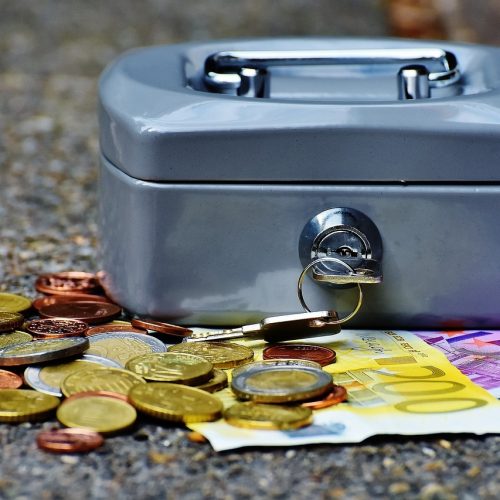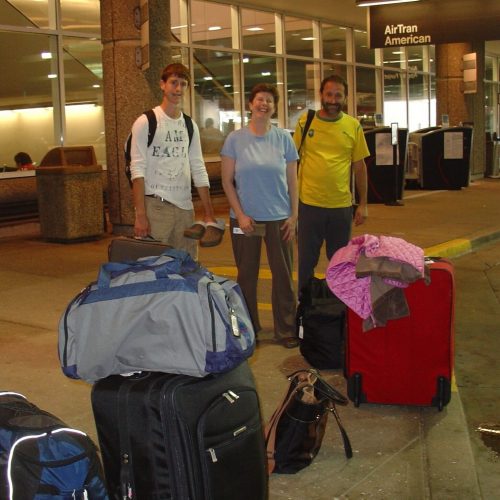
Managing Finances for a Short-term Stay in Spain
Dear Amanda,
As people who have done semester- and year-long study abroad stints and year-long teach abroad programs, we understand the temptation to focus your energy on the exciting aspects of your move (what clothes and toiletries to bring, the best places to eat out in your city, countless day trips you can plan, etc). However, don’t forget to prepare for the more mundane―but utterly important―aspects like finances, too!
Important Note: Things have certainly changed since we first wrote this article in 2017 and so we are updating the details and adding caveats where applicable. Please keep in mind that this article is aimed at how you may want to approach your finances for a short-term stay in Spain. If you will be around for more than a year, you may be better off setting up more permanent financial options in Spain.
Additionally, if you will be working for a Spanish company or renting your own place and putting utilities in your name, it will likely be necessary for you to set up a Spanish bank account regardless. However, this post is aimed at less long-term / permanent options for the expat who is looking to maintain their finances in their home country.
 What You Need to Know About Spain in Terms of Finances
What You Need to Know About Spain in Terms of Finances
Spain is still a bit more traditional when it comes to money habits and payment trends. That’s not to say that Spain isn’t picking up technological advancements—contactless card payment is the norm at restaurants and shops and payment via Apple Pay or Google Pay from your watch or other device is also becoming more widely accepted. The difference, though, is that people tend to use these payment options for bigger purchases, not single items.
As such, you may find that having cash on hand is more helpful in Spain than you’re used to back home. If you’re stopping into a café for nothing more than a drink, you may get a funny look if you try to pay by card (especially because beverages are very affordable and Spaniards still find it a little odd to pay a 1-2 € bill with card).
Beyond just being out-of-the-ordinary, you may also find that there is actually a 10 € minimum for payment by card. This is not the case everywhere, but if you don’t have any cash on you, it is smart to ask ( ¿Se puede pagar con tarjeta? ) in advance of placing an order to avoid uncomfortable situations. In general, large businesses like supermarkets, department stores, and restaurants tend to view payment by card as the norm. However, small businesses like cafés, kiosks, and mom-and-pop shops tend to deal more often in cash. This may also vary depending on where you are in Spain. You’re unlikely to have issues paying by card in a metropolitan city like Madrid or Barcelona, but if you find yourself in a small pueblo, the cash economy will be stronger.
Pro-Tip: If you are taking a taxi, be sure to confirm ahead of time that you can pay by card. Although taxi drivers should always have this payment option available, it’s very common for them to claim their card machine is broken (whether or not that’s the truth, we couldn’t tell you).
Now that we’ve got the basics covered, let’s take a look at some of the best options to allow you hassle-free finances in Spain.
Before You Move to Spain, Optimize Your Finances By Securing:
1. An international-friendly bank account: This is the first step to smooth sailing with your finances abroad. Have a chat with an agent at your current bank and inquire about the cost of withdrawals and transactions in another country and in another currency. Most banks aren’t very accommodating when it comes to banking abroad. Keep in mind that even a ‘small fee’ of $5 or 2% will quickly add up over a six month (or longer) period.
If you’re unsatisfied with what your bank has to offer, shop around! (Our experience is with moving from the US, so we will focus on those specifics.) Some American banks have international partners at which you can do your withdrawals without fees. And other banks are fantastic and guarantee reimbursement on any ATM fees you may rack up while abroad. Check out more details about banking preparation here.
Pro Tip: Dani has personally been using Charles Schwab for almost a decade now and could not be more pleased with her experience. Not only has she never been charged for ATM withdrawals, but they have a 24-hour Live Chat option online as well as a free international phone number so she has never had an issue getting assistance when she’s had questions. We have not been endorsed by this bank nor do we guarantee they are the best option for you, but Charles Schwab’s flexibility and customer service continues to go above and beyond expectations so we never lose an opportunity to recommend them!
 2. Travel-friendly Credit cards: You’ve probably heard people talking about how it’s good for your credit score to (responsibly) use a credit card. So, perhaps now is the perfect moment to get started! As previously mentioned, you may get funny looks or get shut down when trying to buy your café con leche with a credit card, this may not be a bad idea for those bigger purchases, like travel. Additionally, some cards like Capital One and Chase help you accumulate points that can be used for flights and travel accommodations in the future. Depending on your goals and personal spending limits, this could be a good option to reap the benefits while in Spain or later in life. Just be sure to stay on top paying it back! For a comprehensive guide to the best travel credit cards, check out this resource.
2. Travel-friendly Credit cards: You’ve probably heard people talking about how it’s good for your credit score to (responsibly) use a credit card. So, perhaps now is the perfect moment to get started! As previously mentioned, you may get funny looks or get shut down when trying to buy your café con leche with a credit card, this may not be a bad idea for those bigger purchases, like travel. Additionally, some cards like Capital One and Chase help you accumulate points that can be used for flights and travel accommodations in the future. Depending on your goals and personal spending limits, this could be a good option to reap the benefits while in Spain or later in life. Just be sure to stay on top paying it back! For a comprehensive guide to the best travel credit cards, check out this resource.
Pro tip: If you’re still in college, it’s likely you have little-to-no credit and it may therefore be difficult for you to get approved for a credit card. Take advantage if your parents already have a card with a bank/company that you are interested in and see if they can co-sign for you or if you can be added to their account.
3. PayPal: If you don’t already have an account, this is a great recommendation―while living abroad or not. PayPal allows you to set up your account with a credit card or your bank account (with no fees for exchanges of the same currency from a bank account). By creating a “pay me” page or simply giving friends or family the email address you used to set up the account, they can easily transfer money to you and it is available within minutes. PayPal is also an accepted, secure method of payment on most websites and will help protect you when making purchases online (in any currency).
Keep in mind that the country / currency you set up your account with will be your “default currency.” If you are setting up a PayPal account with an American card or bank account, your currency will therefore be in US dollars and there are generally fees associated with transferring euros and sometimes making payments in euros.
Pro Tip: This is a perfect option if you are booking travel plans with friends or needing a boost to your bank account from your loving parents. However, this money is digital and is therefore only useful for transactions you will do online. As far as I know, there is not currently a way to withdraw from your account for cash, so keep that in mind. Additionally, transfers between accounts registered in different currencies are NOT free so beware when dealing internationally.
 4. A Wise account: Previously known as Transferwise, Wise now not only allows you to make efficient and inexpensive international bank transfers, but it also offers a multi-currency account through which you can send and receive money in multiple currencies (a limitation of PayPal). You can even get a local bank account number in multiple countries so you can avoid the stress of having to set up a Spanish bank account but still have a valid account number for things like direct payments from work or utility bills. For 7 €, you can also order a Wise debit card, which will allow you to do transactions on- and off-line in the local currency.
4. A Wise account: Previously known as Transferwise, Wise now not only allows you to make efficient and inexpensive international bank transfers, but it also offers a multi-currency account through which you can send and receive money in multiple currencies (a limitation of PayPal). You can even get a local bank account number in multiple countries so you can avoid the stress of having to set up a Spanish bank account but still have a valid account number for things like direct payments from work or utility bills. For 7 €, you can also order a Wise debit card, which will allow you to do transactions on- and off-line in the local currency.
Please note: We do not have personal experience with a Wise multi-currency account and so we cannot vouch for the effectiveness of this bank account and card in Spain. However, we regularly use their international transfer options (between traditional bank accounts) and believe it to be a reputable company and a viable option you may want to explore.
A Few Further Thoughts on Managing Your Finances as an Expat
All of that said, no matter which of the above routes you decide to use, remember that not all conversion rates are not equal! When using an international card in Spain, it’s common for ATM or card readers to ask if you would like to complete the transaction in dollars (or your default currency) or euros (or the local currency). We find it is typically best to choose euros (the local currency) and allow your personal bank to manage the conversion. However, this may not be true in all cases, so be sure to consult your bank, credit card company, Pay Pal, and/or Wise policies before you transfer, withdraw, or make a transaction in order to avoid losing a lot in the exchange.
 If you’ll be staying in Spain for a longer period of time (especially if you will be working), you’ll have some other factors to consider and will probably need to get a Spanish bank account. You may also need to look into your options for dealing with student loans. It’s a whole different ball game, so we’ve shared some tips with you on that elsewhere. We also recommend you check out this resource on Working Abroad: How to Prepare Your Finances for some of the factors you may not have considered yet but that will become very important during your time abroad.
If you’ll be staying in Spain for a longer period of time (especially if you will be working), you’ll have some other factors to consider and will probably need to get a Spanish bank account. You may also need to look into your options for dealing with student loans. It’s a whole different ball game, so we’ve shared some tips with you on that elsewhere. We also recommend you check out this resource on Working Abroad: How to Prepare Your Finances for some of the factors you may not have considered yet but that will become very important during your time abroad.
Feel free to share about your personal experiences or let us know if you’ve got any questions in the comments below.
Sincerely,
Spain




